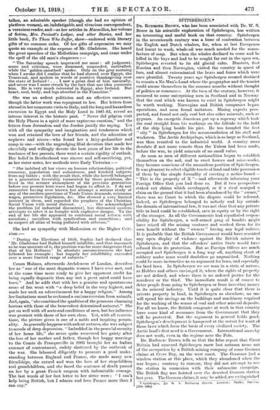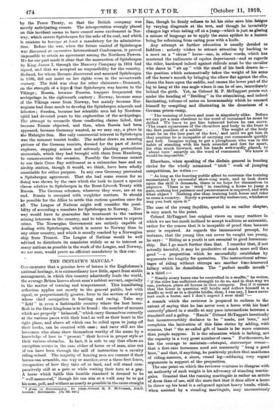SPITSBERGEN.*
RUDMOSE. BROWN, Who has been associated with Dr„ W. S. Bruce in his scientific exploration of Spitsbergen, has written an interesting and useful book on that-country. Spitsbergen in the seventeenth century was a bone of contention between the English and Dutch whalers, for, when at last Europeans had. learnt to wash; whale-oil was much needed for the manu- facture of soap. But when the whales declined to come and be killed in the bays and had to be sought far out in the open sea, Spitsbergen reverted to its old glacial calm. Hunters, first Russian and then Norwegian, visited the country in quest of furs, and almost exterminated the bears and foxes which were once plentiful. Twenty years ago Spitsbergen seemed- destined to remain a No-Man's-Land where the geographer and the tourist could amuse themselves in the summer months without thought of politics or commerce. At the turn of the century, however, it occurred to some enterprising men in Scotland and in Norway that the coal which was known to exist in Spitsbergen might be worth working. Norwegian and British companies began operations, and soon found imitators. Mining experts pros- pected, and found not only coal but also other minerals, such as gypsum. An energetic American put up a ropeway which took the coal straight from his workings on the hillside to the hold of the ship lying beside his pier. He too founded the first " city " in Spitsbergen for the accommodation of his staff and workmen. The Arctic Archipelago, which is as large as Scotland, was thus reunited to the industrial world. A country more desolate if not more remote than the Yukon had been made, before the war, to yield minerals of no small value.
As soon as men of different nationalities began to establish themselves on the soil, and to erect houses and mine-works, they became conscious of the anomalous position of Spitsbergen. It was pleasant to select eligible tracts of land and take possession of them by the simple formality of erecting a notice-board- " This is the property of X "—and afterwards informing your Foreign Office that you had done so. But if two prospectors staked out claims which overlapped, or if a rival usurped a claim on the ground that it had been abandoned by the " owner," there was no Court to which the dispute could be referred. Indeed, as Spitsbergen belonged to nobody and lay outside the domain of international law, it was not clear that any private title to land could be established, save in equity or by the right of the stronger. As all the Governments had repudiated respon- sibility for Spitsbergen, a well-armed gang of bandits might have seized all the mining ventures and worked them for its own benefit without the " owners " having any legal redress. It is 'probable that the British Government would have resented any open display of violence against the British miners in Spitsbergen, and that the offenders' native State would have refused them its protection. But as Foreign Offices arc much occupied and Spitsbergen is a long way off, anything short of robbery under arms would doubtless go unpunished. Nothing could be more instructive as an argument for laws, and especially for land laws. In Spitsbergen we see man in a state of nature, as Hobbes and others envisaged it, where the rights of property arc not defined, and where there is no ordered justice for the murderer or the thief. The immediate result is of course to deter people from going to Spitsbergen or from investing money in its mineral industry. Until it is quite clear that there is private property in land, in Spitsbergen as elsewhere, no one will spend his savings on the buildings and machinery required for the working of the seams of coal and other mineral deposits. For all we know, the British companies at work in that country have some kind of assurance from the Government that they will be protected. But the argument in general holds good. Spitsbergen's development is hampered at the outset for want of those laws which form the basis of every civilized society. The Arctic land's first need is a Government. International anarchy does not work, even in the regions near the Pole.
Dr. Rudmcse Brown tells us that the false report that Great Britain had annexed Spitsbergen anew last autumn arose out of the occupation by a British mining company of some German claims at Cross Bay, on the west coast. The Germans had a wireless station at this place, which they abandoned when the war began ; contrary to rumour, they did not attempt to use the station in connexion with their submarine campaign. The British flag was hoisted over the deserted German station last year. The German claims, it may be added, arc extinguished
• Spilshergett. Dv IL N. Maims° Brown. London: Seeley. Service. i2.5s. not.) by the Peace Treaty, so that the British company was merely anticipating events. The interpretation wrongly placed on this incident seems to have caused some excitement in Nor- way, which covets Spitsbergen for the sake of its coal, and which is anxious to become at least a mandatory for its administra- tion. Before the war, when the future control of Spitsbergen was discussed at successive International Conferences, it proved Impossible to attain an agreement among the Northern Powers. We for our part made it clear that the annexation of Spitsbergen by King James I. through the Muscovy Company in 1614 had lapsed, and that we accepted no responsibility for the country. Holland, for whom Barents discovered and annexed Spitsbergen In 1596, did not insist on her rights even in the seventeenth century. The field was clear for other claimants—Denmark, on the strength of a leger d that Spitsbergen was known to the Vikings ; Russia, because Russian trappers frequented the archipelago in the eighteenth century ; Norway, because some of the Vikings came from Norway, but mainly because Nor- wegians had done much to develop the Spitsbergen minerals and fisheries ; Sweden, because her scientific men led by Nordens- kjold had devoted years to the exploration of the archipelago. The attempt to reconcile these conflicting claims failed, first because Russia objected, and then, when Russia had been appeased, because Germany wanted, as we may say, a place in the Midnight Sun. Her only commercial interest in Spitsbergen was the summer tourist traffic. The author draws an amusing picture of the German tourists, dressed for the part of Arctic explorer, stepping ashore and solemnly planting pretentious memorials, which they had brought with them from Hamburg, to commemorate the occasion. Possibly the Germans meant to use their Cross Bay settlement as a submarine base and an airship station, though it would, we think, have been wholly unsuitable for either purpose. In any case Germany prevented a Spitsbergen agreement. That she had some reason for so doing was shown by the care which she took to insert a special clause relative to Spitsbergen in the Brest-Litovsk Treaty with Russia. The German schemes, whatever they were, are at an end. Russia is occupied with weightier matters. It should be possible for the Allies to settle this curious question once for all. The League of Nations might well consider the possi- bility of according a mandate for Spitsbergen to Norway. Nor- way would have to guarantee fair treatment to the various mining interests in the country, and to take measures to repress crime. The Norwegian Government are entirely capable of dealing with Spitsbergen, which is nearer to Norway than to any other country, and which is usually reached by a Norwegian ship from Tromso. The League of Nations would be well advised to distribute its mandates widely so as to interest as many nations as possible in the work of the League, and Norway, we are sure, would prove an efficient mandatory in this case.



































 Previous page
Previous page